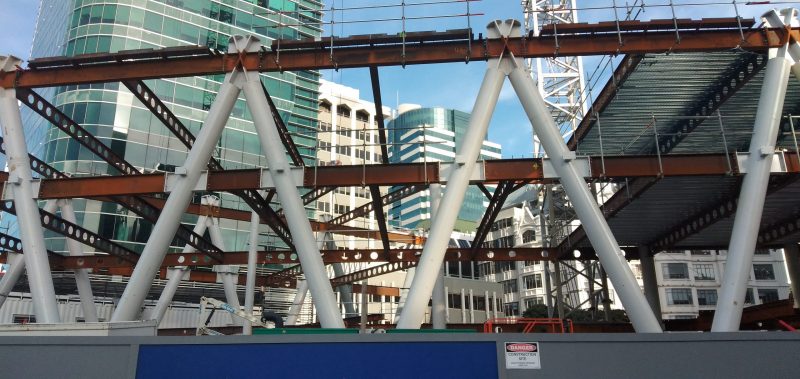Hutt Valley manufacturer stepping up to fill skill shortages
Like many other industries across New Zealand at present, the manufacturing industry is struggling with a shortage of trained talent due to Covid-19 restrictions on immigration and current work levels.
One Hutt Valley manufacturer is taking on this challenge proposing an innovative way to help young people into engineering.
MJH Engineering Ltd is one of New Zealand’s leading structural steel fabricators, specialising in the fabrication and installation of large-scale structural steel projects including industrial warehouses, commercial buildings, multi-storey tower-blocks, and seismic strengthening projects.
Over the past couple of years, the Seaview-based company has grown in size due to its excellent track record of delivering top quality results and its reputation as one of the preferred steel subcontractors around town.
Jeremy Mikoz, HR & Development Manager for MJH Engineering Ltd, says with the demand of projects comes the challenge of finding the right workers.
“While there are private training enterprises out there, we’re finding in our industry that many students coming out of these institutions just aren’t receiving the training they need to be ‘job ready’.
“On top of that New Zealand is now in one of the worst labour shortages we have seen in the last 10 years which in turn puts more pressure on obtaining talent and solving our work-flow issues.”
As a result, Mikoz says they have come up with a solution – the “MJH Welding School.” The school, based at MJH Engineering, would provide a 6-week full-time training course with qualifications to help young people learn on the job skills and theory in welding.
At the end of this course, the young people would come out with Unit Standards, a welding qualification, and 240 hours of practical, industry-related training. To top it off MJH Engineering would guarantee the 6 young people with jobs at the end of their training programme.
MJH Engineering approached the Hutt Valley Chamber of Commerce for advice, and they are now advocating on their behalf to help them discuss some funding options to get the Welding School up and running.
“We’re grateful for the support we have been getting from the Chamber. They understand the predicament we’re in with staff shortages and the lack of quality of young people coming out of the pre-trade courses at our polytechnics.
“MJH are not expecting to run this work at a profit, but instead invest in the future of some young people to help them into sustainable employment.
“If anything, the cost to MJH will be substantial due to setting up a bespoke welding bay, equipment costs and taking senior staff off their projects to help train the students.
However, we see this as a way forward to give back to the community and assist our industry with new thriving talent who may not ever have been aware of how to get into it.”
Patrick McKibbin, Chief Executive of the Hutt Valley Chamber of Commerce, says MJH Engineering is not alone when it comes to skill shortages in the industry.
“Talent is a significant issue for businesses in the Hutt Valley, with more than 60% finding it harder to get skilled talent and over 40% finding it harder to get lower skilled talent.
“We believe training programmes like the Welding School are one option to help young people into employment and create a longer-term opportunity for young people to enter apprenticeships with long term, high paid employment.
“Over time we hope the potential of the government changes to the Vocational Education system will make a difference and address the challenges employers are having today.”
Over the past 18 months the Chamber has been rolling out the Education to Employment programme to facilitate the community’s youth into rewarding vocations and careers.
The programme is part of the Reform of Vocational Education (ROVE) plans by the Government to completely restructure vocational education nationwide, as a direct response to ongoing labour and skill shortages.
The Chamber has been working with schools and students to help them transition from education into vocational careers, facilitating apprenticeships, work experience and trades training with employers.
Last month it held an Employment Expo where over 100 students from around the Hutt Valley were exposed to more than 20 different businesses and vocational opportunities.
“The feedback we’ve had so far from businesses and schools has been extremely positive with every single employer stating the Expo exceeded or met expectations and they would participate again. Employers received CVs from almost 202 students, and this has created over 120 follow up conservations.”
MJH Engineering is one of those participating employers who benefitted from the Expo.
“We found the Expo really useful because a lot of school leavers are unsure about the opportunities out there, aside from the traditional academic route of attending a university or polytechnic.
“We already have a student who attended the Expo coming along for some work experience in December and if he is keen following a trial period, then we will look to take him on a paid apprenticeship next year,” said Mikoz.
When it comes to opportunities in the manufacturing and engineering industry in New Zealand, Mikoz doesn’t hold back.
“The opportunities for progression in this industry are huge. One prime example is one of our senior project managers who started sweeping the floors for us as a 17-year-old school leaver.
“After receiving on the job training, he moved into a welding position, got his apprenticeship, became a tradesman, then worked his way up to a supervisor role.
“He became a key player in the day-to-day running of the workshop, managing projects between $500,000 and $3 million. In just over a decade, he is now in one of the highest roles at MJH and thriving. The opportunities are there for the people who decide to take them.”



